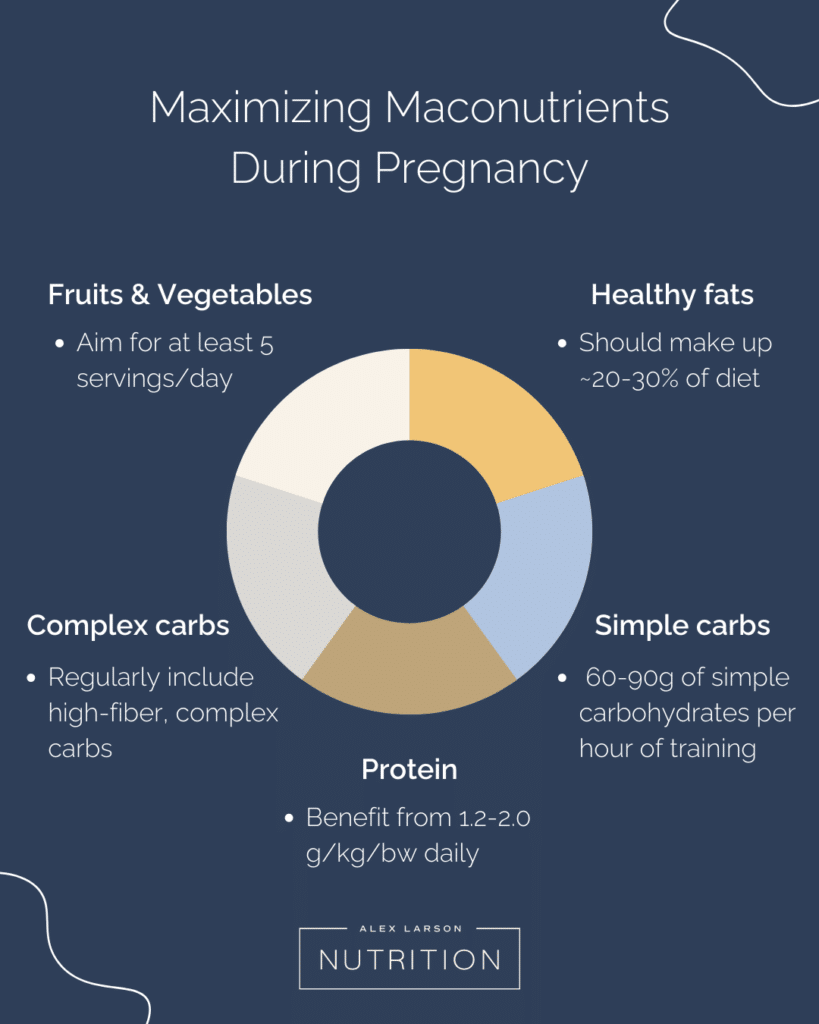Level Up Your Nutrition Game With Our Freebies
Alex
I provide nutrition coaching for endurance athletes to improve performance and body composition through a simple and flexible eating style.
Hi, I'm
ATHLETE EATING GUIDE →
LEARN MORE →
ATHLETE GROCERY SHOPPING GUIDE →
10-DAY PROTEIN-PACKED SAMPLE MEAL PLAN
READY TO FUEL?
incredible value!
The fueling guide bundle serves as your one-stop-shop for strategies to fueling before, during and after your workouts.
The journey to motherhood is a whirlwind! As you prepare for the excitement (and apprehension) of a new little one, sifting through nutrition during pregnancy information can be overwhelming. Fortunately, it doesn’t need to be. My team and I are here to support you as a mother runner so ready, set, go! Let’s review how to support your training and support a healthy pregnancy for you and baby.
Importance of prenatal nutrition for endurance athletes
Nutrition during pregnancy can be challenging for women due to the plethora of symptoms that come with changing hormones. Unbearable fatigue, persistent nausea, and morning sickness to name a few. It is not uncommon to experience several of these unwanted symptoms during pregnancy and place fitness goals on the backburner. Regardless of your endurance goals throughout pregnancy, try to look past the toilet bowl if you are head deep in it. Envision this as the perfect opportunity to maximize nutrition while meeting more than just your nutrition needs. But also building a solid foundation for a healthy pregnancy and a healthy baby.
Loving this prenatal content? Don’t forget to check out these complimentary ALN blog articles:
Postpartum Nutrition: Fueling the Active New Mom
Alex’s Best Lactation Cookies Recipe
Nutrition During Pregnancy

While many physiological adaptations occur during pregnancy, the total amount of calorie intake does not increase until the second and third trimesters. The extra calorie requirement beyond the usual to support training is approximately 350 calories/day in the second trimester and 450 calories/day in the third trimester. So while “eating for two” is typically recommended, it really is just the opposite. Think of it as maximizing quality over quantity as 350-450 additional calories per day is easy to consume in the form of oatmeal bake with nut butter or a hummus and veggie sandwich.
A Balancing Act – Maximizing your Macro and Micronutrients
Carbohydrates are premium fuel when it comes to filling your nutrition tank because carbohydrates are the body’s favorite, most efficient, source of energy. When you consume carbohydrates, your body breaks the food into glucose (sugar) and either uses it for activity (i.e. a run) or converts into glycogen to be used later. Typically, most athletes require at least 55% of their calorie intake from carbohydrates though this can vary based on factors such as duration and intensity of the workout. It is important to recognize that not all carbohydrates are the same but during pregnancy and training, you will be consuming both simple and complex carbohydrates to fuel those miles.

Simple carbohydrates:
Easy-to-digest carbs including sugar, energy gels, sports drinks, fruit and juice, candy, and foods with added sugars. Foods that are high in simple carbohydrates are low in fiber and break down quickly to be used as energy. These foods are effective while training to provide quick bursts of energy. During your training, it is imperative to take in enough simple carbohydrates so that you do not run out of fuel and typically 60-90g of simple, easy-to-digest carbohydrates per hour is the target for most athletes, even while pregnant. Caution on the energy gels and sports drinks with excessive caffeine.
Complex carbohydrates:
Complex carbs can take longer to digest and are found in higher fiber, nutrient-dense foods such as whole grains, legumes, starchy vegetables such as sweet potatoes, among others. These foods are excellent to include throughout the day in meals and snacks to boost your vitamin and mineral intake and help keep you feeling satisfied and baby nourished. To reduce your risk of gestational diabetes, regularly include high-fiber complex carbohydrates.
Protein:
While protein is important throughout the entire pregnancy, it is especially critical during the second and third trimesters. Most pregnant athletes will benefit from 1.2-2.0g of protein per kilogram of body weight (based on your pre-pregnancy weight), which should be spaced throughout the day. 70-100g of protein per day is the minimum. Lean protein-rich food sources to include regularly include: poultry, fish, beef, eggs, Greek yogurt and cottage cheese, tofu, tempeh, seitan, edamame, and legumes. If you find yourself constantly short on meeting your protein needs, consider topping your toast with an extra egg or making your own trail mix to nibble on.
Healthy Fats:
Fat is your baby’s main source of energy and is vital for brain development. ~20-30% of your diet should be composed of healthy fat sources including olive oil, nuts and seeds, olives, avocado, or 8-12 ounces of lower-mercury fish per week. Flaxseed, chia seed and walnuts are extremely rich sources of omega 3 fatty acids (which contain EPA and DHA). Research shows that regular consumption can help reduce inflammation from training demands and also support fetal brain development.
Fruits and vegetables:
Aim for at least 5 servings of fruits and vegetables per day. Focus on a wide range of produce to get in a variety of micronutrients. Top your Greek yogurt with berries, add spinach and peppers to your eggs, or enjoy sliced apples with almond butter to sneak in more nutrients. Fruits and vegetables are extremely rich in fiber which can help to lessen unwanted pregnancy constipation.

Nutrition During Pregnancy: Putting It Together For You and Baby
Other easy ideas for sneaking in a few more calories to support you and the baby include:
- Add a bonus snack. Be sure to include a protein-rich food source such as cottage cheese, hard boiled eggs, or even a protein bar. A few super easy energy bites are one of my favorites. Be sure to reference our high-protein snack pack list for more ideas.
Caution on any higher-risk foods including raw sprouts, unheated deli meat, unpasteurized dairy, and raw or undercooked meat. More information on food safety during pregnancy can be found here.
- Rely on liquid protein and calories, particularly if you experience early satiety or reflux. Include a protein base such as Greek yogurt or protein powder and toss in frozen fruit, milk, and nut butter.
Be sure to opt for a protein powder that is third-party tested and free of unnecessary ingredients. I personally love Thorne’s Whey Protein Isolate (use link for 15% off).
- Eat small, more frequent meals and snacks throughout the day while focusing on including high-quality foods such as fruits and vegetables. Most pregnant athletes are going to benefit from 3 meals and 2-3 snacks throughout the day.
Handling the Hurdles of Prenatal Nutrition

Unfortunately, the following symptoms can derail good nutrition during pregnancy, even for the most well-intentioned athletes:
Food Aversions
For 6 out of 10 people experience food aversions during pregnancy, mostly in part to hormonal changes. The food aversions can also be associated with morning sickness. Common food aversions include meat, eggs, dairy, and spicy foods. In most cases, avoid your aversions and eat the foods that do sound appealing– within moderation. If your aversions include high-nutrient foods that are important, make sure that you are optimizing those nutrients in other ways. For example, if you have an aversion to poultry, try to increase high-protein foods such as Greek yogurt, legumes, eggs, or even a protein bar.
Alex’s personal favorite remedy for morning sickness is a glass of Fairlife chocolate milk. The protein, micronutrients and delicious chocolate flavor are the perfect combination when feeling nauseous to help you feel better.
Constipation
During pregnancy is very normal, common, and certainly unwanted. An increase in progesterone hormones that relax the intestinal muscle causes food waste to travel much slower through your system. Symptoms often include abdominal pain or discomfort, difficulty with bowel movements, and passage of hard stools. Fortunately, there are a few strategies to help. I frequently tell athletes that motion is lotion. Going for an easy jog often precipitates a hearty bowel movement. Be sure to regularly include high-fiber fruits, vegetables, and whole grains. Staying well-hydrated also helps and soothing beverages such as decaffeinated peppermint are beneficial. There is some research supporting magnesium supplementation as a remedy but be sure to discuss this with your medical provider.
Heartburn
Indigestion, also known as heartburn or acid reflux, is quite common during pregnancy. Symptoms often include a burning sensation or pain in the chest, early fullness, burping, and even bringing up food. These symptoms are most prevalent after 27 weeks of pregnancy. To better control these undesirable symptoms, it is often focused to opt for smaller, more frequent meals. Cutting down on caffeine (limit to <200mg/day), overly spicy or fatty foods and sitting upright after eating can help.
Endurance Eats Video Series – Pregnancy and Postpartum Nutrition for the New Mom
Tune in as Alex and her female athlete dietitian team discuss prenatal and postpartum nutrition for the active moms! And, make sure to tap that subscribe button to catch future videos!
IN THIS EPISODE:
(0:00) – Welcome
(2:35) – Nutrition considerations for female athletes during pregnancy
(19:45) – Nutrition recommendations for after pregnancy when wanting to return to fitness and training
(28:30) – Rapid fire questions on dietitians Alex and Mary’s experiences as pregnant new mom athletes
Prenatal Vitamins for Endurance Athletes

If you are planning to become pregnant within the next 3 months, start taking a prenatal supplement. If you are already pregnant, consistently take a quality prenatal supplement to optimize your micronutrient intake. Even if you eat a healthy and balanced diet, it is important because you have increased nutrient needs during pregnancy. Many pregnant endurance athletes also need to take additional iron supplementation, though this should be discussed with your medical provider. As always, opt for a prenatal supplement that is third-party tested.
Research shows the following are key vitamins and minerals that are also important for fetal development.
| Nutrient | Recommended Daily Amount During Pregnancy (per day) | Benefits | Food sources |
| Calcium | 1000mg | Builds strong bones and teeth | Dairy products, leafy green vegetables, fortified orange juice |
| Iron | 27mg | Helps red blood cells deliver oxygen to the fetus | Red meat, poultry, fish, eggs, legumes, fortified cereals, blackstrap molasses, green vegetables |
| Iodine | 220mcg | Healthy brain development | Iodized salt, dairy products, seafood, meat, eggs |
| Choline | 450mg | Fetal brain and spinal cord development | Milk, beef, liver, eggs, peanuts, soy products |
| Vitamin A | 770mcg | Healthy skin and vision | Carrots, green vegetables, sweet potatoes |
| Vitamin C | 85mg | Healthy gums, teeth and bones | Citrus fruit, broccoli, tomatoes, strawberries |
| Vitamin D | 600IU | Builds teeth and bones; helps promote healthy eyesight | Sunlight, fortified milk and milk alternatives, oily fish such as salmon |
| Vitamin B6 | 1.9mg | Helps form red blood cells | Beef, liver, pork, fortified cereals |
| Vitamin B12 | 2.6mcg | Maintains nervous system; helps form red blood cells | Meat, fish, poultry, milk |
| Folic acid | 600mcg | Helps prevent birth defects of the brain and spine | Fortified cereals, bread and pasta, nuts, green vegetables, beans |
*These recommendations are based on a singleton pregnancy, ages 19-50. Nutrient needs are increased when pregnant with multiples.
Plant-Based Nutrition During Pregnancy
Hitting those micronutrient marks above is just as important for plant-based endurance athletes who are pregnant. Since plant-focused diets omit certain food groups, plant-based athletes are at an increased risk for nutrient deficiencies and pregnancy can heighten this risk. This includes vitamin B12, iron, calcium, and omega-3 fatty acids. These four nutrients are abundant in animal products and low in plant foods. Be sure to consistently take a prenatal supplement and optimize nutrient intake as listed above.

Weight Gain Recommendations and Guidelines during Pregnancy
An increase in weight throughout pregnancy is recommended to support healthy fetal development. Increased fat stores, fluid and blood volume, the placenta, amniotic fluid, larger breasts and a larger uterus all account for the pregnancy weight gain. Evidence-based weight gain recommendations are based on your pre-pregnancy weight and body mass index (BMI).
For a woman who is underweight, it is typically recommended to gain 28-40 lbs (13-18kg) and for a woman with a healthy weight, it is recommended to gain 25-35 pounds (11-16kg).
Note, that these recommendations are contingent on many factors and also increase if you are carrying twins or multiples. During the first 3 months of pregnancy, it is very normal and common to have no weight gain or a small gain up to 5 pounds. After the first trimester, typically a weight gain of up to 1 pound weekly is normal.
Each woman is truly very different in how the weight gain trajectory looks. For example, some women lose weight during the first trimester due to increased nausea while some women gain more weight during the third trimester due to fluid retention. Furthermore, there is no global consensus on weight gain recommendations during pregnancy. So while the aforementioned weight gain guidelines are advised in the United States, research shows the weight gain recommendations are different in other countries.
Nesting
Your never-ending to-do list preparing for your baby is only getting longer. But we highly recommend reaching out if you are planning to get pregnant or are a pregnant endurance athlete so we can help you optimize your nutrition during pregnancy and training! Be sure to apply today!
Alex
I provide nutrition coaching for endurance athletes to improve performance and body composition through a simple and flexible eating style.
Hi, I'm
LEARN MORE →
take the quiz!
Let's discover your Endurance Nutrition IQ
How well do you know your fueling? Answer these questions and let's see where your endurance nutrition knowledge is at!
Take the quiz
level up your nutrition game with these freebies
free downloadS
Protein-Packed 10-Day Sample Meal Plan
Athlete Eating Guide
Athlete Grocery Shopping Guide
1
2
3
Inspiration to fit 120 grams of protein into your day
Planning what goes on your plate
Putting the right foods in your grocery cart
